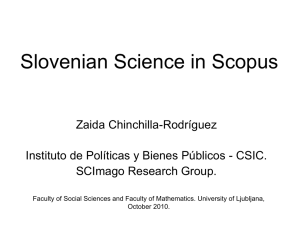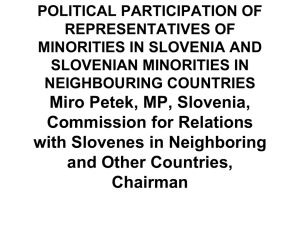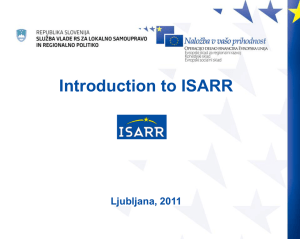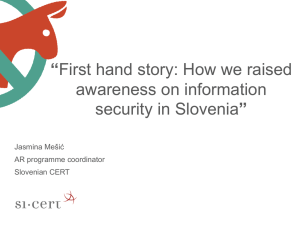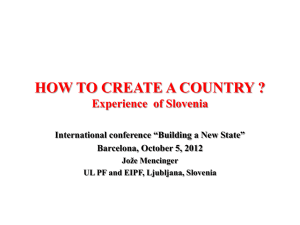Text of the pro memoria on the Slovenian minority in Italy
advertisement
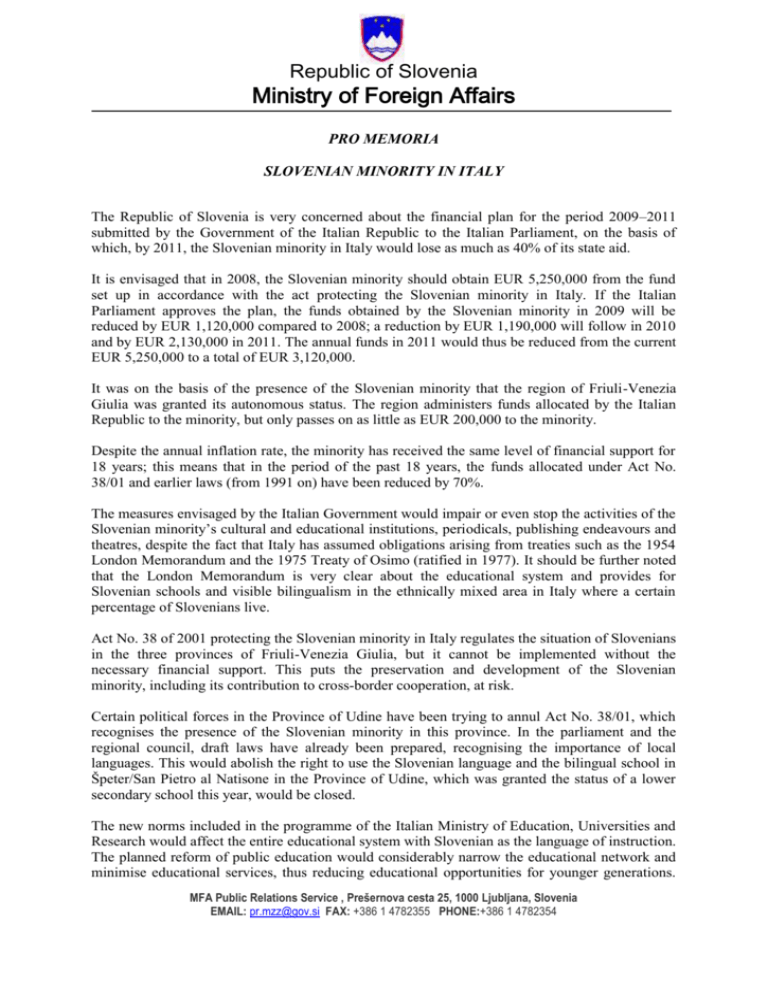
Republic of Slovenia Ministry of Foreign Affairs PRO MEMORIA SLOVENIAN MINORITY IN ITALY The Republic of Slovenia is very concerned about the financial plan for the period 2009–2011 submitted by the Government of the Italian Republic to the Italian Parliament, on the basis of which, by 2011, the Slovenian minority in Italy would lose as much as 40% of its state aid. It is envisaged that in 2008, the Slovenian minority should obtain EUR 5,250,000 from the fund set up in accordance with the act protecting the Slovenian minority in Italy. If the Italian Parliament approves the plan, the funds obtained by the Slovenian minority in 2009 will be reduced by EUR 1,120,000 compared to 2008; a reduction by EUR 1,190,000 will follow in 2010 and by EUR 2,130,000 in 2011. The annual funds in 2011 would thus be reduced from the current EUR 5,250,000 to a total of EUR 3,120,000. It was on the basis of the presence of the Slovenian minority that the region of Friuli-Venezia Giulia was granted its autonomous status. The region administers funds allocated by the Italian Republic to the minority, but only passes on as little as EUR 200,000 to the minority. Despite the annual inflation rate, the minority has received the same level of financial support for 18 years; this means that in the period of the past 18 years, the funds allocated under Act No. 38/01 and earlier laws (from 1991 on) have been reduced by 70%. The measures envisaged by the Italian Government would impair or even stop the activities of the Slovenian minority’s cultural and educational institutions, periodicals, publishing endeavours and theatres, despite the fact that Italy has assumed obligations arising from treaties such as the 1954 London Memorandum and the 1975 Treaty of Osimo (ratified in 1977). It should be further noted that the London Memorandum is very clear about the educational system and provides for Slovenian schools and visible bilingualism in the ethnically mixed area in Italy where a certain percentage of Slovenians live. Act No. 38 of 2001 protecting the Slovenian minority in Italy regulates the situation of Slovenians in the three provinces of Friuli-Venezia Giulia, but it cannot be implemented without the necessary financial support. This puts the preservation and development of the Slovenian minority, including its contribution to cross-border cooperation, at risk. Certain political forces in the Province of Udine have been trying to annul Act No. 38/01, which recognises the presence of the Slovenian minority in this province. In the parliament and the regional council, draft laws have already been prepared, recognising the importance of local languages. This would abolish the right to use the Slovenian language and the bilingual school in Špeter/San Pietro al Natisone in the Province of Udine, which was granted the status of a lower secondary school this year, would be closed. The new norms included in the programme of the Italian Ministry of Education, Universities and Research would affect the entire educational system with Slovenian as the language of instruction. The planned reform of public education would considerably narrow the educational network and minimise educational services, thus reducing educational opportunities for younger generations. MFA Public Relations Service , Prešernova cesta 25, 1000 Ljubljana, Slovenia EMAIL: pr.mzz@gov.si FAX: +386 1 4782355 PHONE:+386 1 4782354 Republic of Slovenia Ministry of Foreign Affairs The proposal put forward by Minister Mariastella Gelmini envisages a reduction of funds by more than EUR 8 billion, the closure of schools or the merging of schools and their leadership teams, and fewer teachers and lessons. Consequently, only one upper secondary school with Slovenian as the language of instruction out of the existing four would be kept in the Province of Trieste. Schools with Slovenian as the language of instruction in Italy attended by members of the Slovenian minority neither reach the minimum standard of 300 pupils per school to be able to maintain their independence, nor have the required number of pupils in their classes (18 pupils). Due to the envisaged rationalisation, more than 80 teachers, professors and non-teaching staff could lose their jobs in schools with Slovenian as the language of instruction. The planned programme would force many schools with Slovenian as the language of instruction to close their doors to students, despite the fact that Italy is obliged to fulfil its obligations arising from treaties (the London Memorandum of 5 October 1954, the Gerin-Kolenc Agreement of 21 July 1964, the Programme of cooperation in culture between Slovenia and Italy, signed in Rome on 20 October 1994, and the Minutes of the Slovenian-Italian working group of experts on minority education and culture, signed in Ljubljana on 25 May 1995). Schools with Slovenian as the language of instruction are also protected under Italian legislation (Act No. 1012 of 19 July 1961, Act No. 932 of 22 December 1973, presidential decrees Nos. 416 and 417 of 31 May 1974, Act No. 1 of 14 January 1975, Act No. 270 of 20 May 1982, Act No. 341 of 19 November 1990, Presidential Decree No. 233 of 18 June 1998, and Act No. 38 of 23 February 2001). The reducing of funds for the media, i.e. newspapers and radio and TV programmes would deprive the Slovenian minority of information in the Slovenian language. Without daily and weekly newspapers and other local media, members of the Slovenian minority will disappear from public life; due to the small size of the target audience, marketing and ads cannot keep minority newspapers and other media alive. Due to the nation-wide reduction of funds for theatres, the Slovenian Permanent Theatre of Trieste would suffer a similar fate. The theatre will nevertheless retain its status as a permanent theatre, granted by Act No. 38/2001. Its repertoire has always been of a high artistic level and, with subtitles, also accessible to the Italian audience. The work of the theatre will be impossible without the necessary funds. In this regard, it should also be noted that its founders, the Municipality of Trieste, the Province of Trieste and the Autonomous Region of Friuli-Venezia Giulia, have not been fulfilling their legal obligations. In addition, the implementation of Act No. 38/01 protecting the Slovenian minority in Italy has not kept up with the necessary pace. Friuli-Venezia Giulia President Renzo Tondo still has not signed the decree to enable the implementation of protection provisions on visible bilingualism in public administration – or more precisely, visible bilingualism in municipalities forming part of the area where protection provisions will be implemented. Examples of violation of the alreadygranted minority rights have also been noted, e.g. the lack of bilingual signposts on the new motorway section near Trieste, which will soon be opened. Ljubljana, 5 November 2008 MFA Public Relations Service , Prešernova cesta 25, 1000 Ljubljana, Slovenia EMAIL: pr.mzz@gov.si FAX: +386 1 4782355 PHONE:+386 1 4782354
